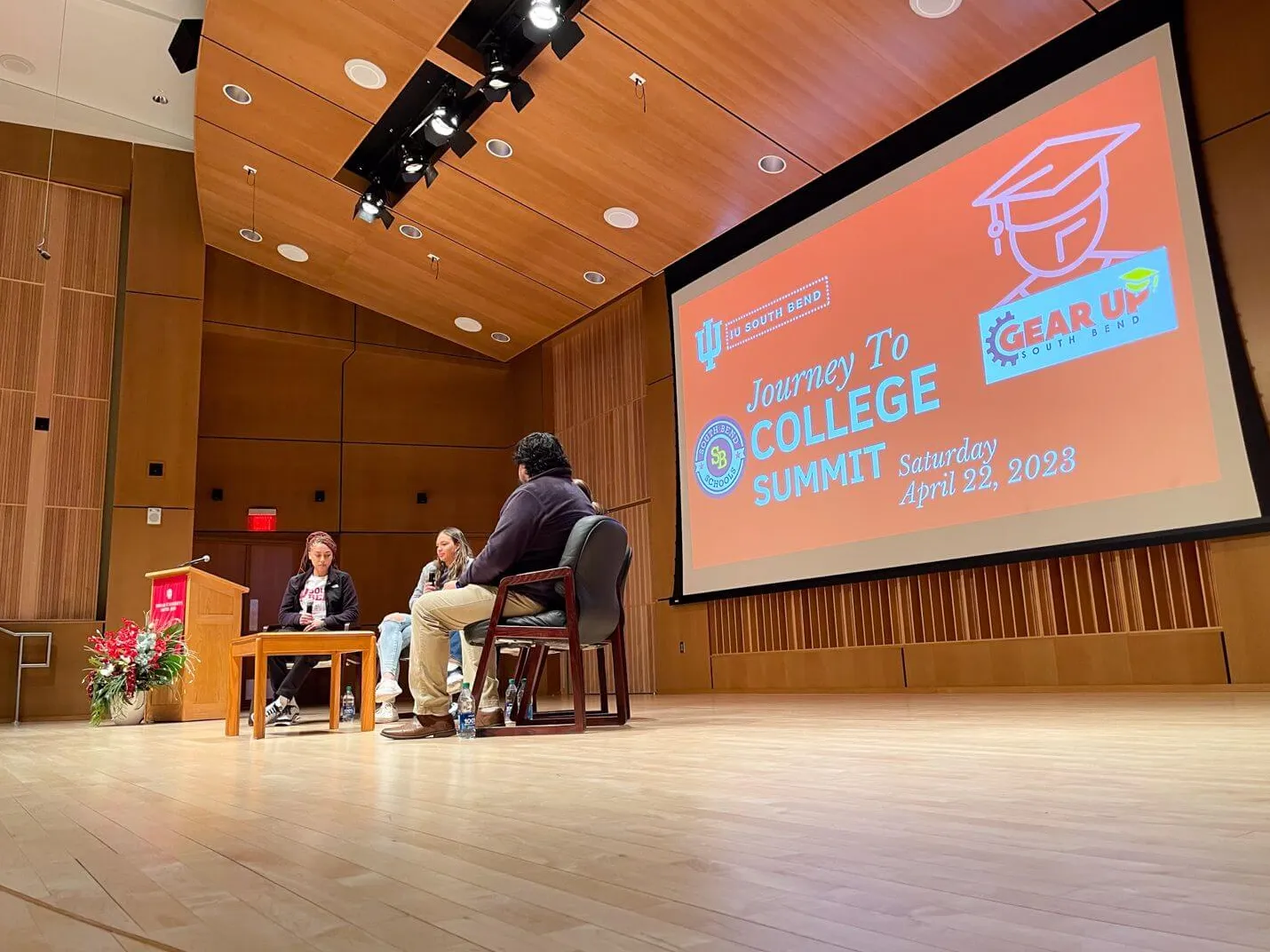Add/Drop Period
Time from registration appointment to a date early in the semester where students can still add a class. Typically, if students also drop a class during this time, it won’t show up on their transcript.
Advising
Each student is assigned an academic advisor who provides information and encouragement they need to take personal responsibility for exploring options and making decisions related to their academics.
Campus
The grounds and buildings of a university, college, or school.
Class Standing
Freshmen, sophomore, junior, senior classification based on total credit hours that count toward degree requirements.
Commencement
Ceremony the university conducts to celebrate graduation.
Course
A series of class sessions focused on a subject.
Course Load
At IU South Bend, full-time course load is between 12 and 16 credit hours each regular semester. Fewer than 12 hours in a fall or spring semester is considered part-time.
Credit
Each course has a corresponding number of credits (often referred to as credit hours) based on how many hours of work it entails. Degrees require a certain number of credits to be earned.
Dean of Students
Leader who connects students to resources across campus.
Dean’s List
Recognition for high academic performance based on GPA.
Degree
A title given to students on completion of a program of study.
Degree Requirements
The criteria a student must meet to earn their degree, including specific courses, number of credits, and cumulative GPA required to graduate.
FAFSA
The Free Application for Federal Student Aid (FAFSA) is a form to complete before each year of college to determine eligibility for federal loans, work-study, and grants, as well as some scholarships.
FERPA
The Family Educational Rights and Privacy Act (FERPA) is a federal law that protects the privacy of student education record.
Final Exam
A test given to students at the end of a course.
Financial Aid
Money that is given or lent to students in order to help pay for their education.
First-Generation
Neither parent of a student having ever graduated from a four-year institution of higher education.
General Education
Courses required as the foundation of an undergraduate degree to ensure students receive a well-rounded education.
GPA
Points are assigned based on grades earned in a class, ranging from A = 4.0 to F = 0.
Grant
A monetary gift for students pursuing higher education. Grants typically do not have to be repaid (unless students withdraw from school).
Hold
Restrictions on registering for classes due to an issue that needs to be resolved by a student, such as an unpaid bill.
Internship
Real world experience while in school that allows a student to explore a potential career field. Could be paid or unpaid, full-time or part-time, or result in earning credit or not.
Loan
Money borrowed to pay for college expenses. Federal loans are based on the FAFSA. Government loans can be “subsidized” (where the interest is paid for until after graduation) or “unsubsidized” (where the interest begins accruing right away). Private loans require separate applications, carry varying terms and conditions set by the lender, and are often more expensive than federal loans.
Major
A subject of academic study chosen as a field of specialization.
Minor
An additional field of specialization requiring fewer courses than a major.
Probation
A student who has completed one or more IU South Bend GPA hours and has a cumulative GPA below 2.0 is placed on probation. A probationary student remains on probation until the cumulative GPA reaches 2.0 or higher.
Registration
The process of signing up for courses. A registration appointment is the earliest date and time a student can register for classes offered during an upcoming term.
Satisfactory Academic Progress
Students receiving aid have their Satisfactory Academic Progress reviewed at least once per year. Students who do not meet the minimum standards are not eligible for financial aid.
Semester
Periods of instruction into which an academic year is divided (fall, spring, summer).
Scholarship
Financial aid awarded based on specific criteria such as an interest or talent.
Syllabus
A document that provides requirements for a course.
Transcript
An official copy of a student's educational record.
Transferring
Moving from one college to another.
Undergraduate
A student who is pursuing their first college degree, typically a bachelor’s degree.
Work Study
Part-time jobs for undergraduate and graduate students with financial need. Work-study programs encourage community service work or work related to chosen area of study.
Did you know that many colleges in our area offer activities on campus for kids? Attending an event or activity at a college campus can be a great way to expose kids to college from an early age.
Sporting Events
Attending a sports game can be a fun way to spend time with your kids on a college campus. The best part is many of these events are free.
Performing Arts and Art Museums
Going to a performance or art museum is another fun way to explore a college campus. Again, many of these events are free and include music, dance, theater, and film.
Nature's Classroom: Exploring the Outdoor Wonders of South Bend's College Campuses
College campuses can be awesome places for nature outings. They are not just for learning but also filled with beautiful trees, flowers, and sometimes even rivers or lakes. Whether you love picnics, walks, or just exploring, these campuses have lots of cool spots to see.



 Get any remaining questions
Get any remaining questions  What are the best things about being in college? What’s been difficult?
What are the best things about being in college? What’s been difficult? Check in with your student about classes/assignments and work/outside responsibilities.
Check in with your student about classes/assignments and work/outside responsibilities.